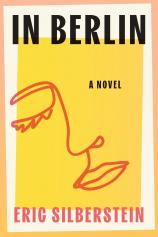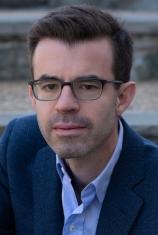Excerpt
Excerpt
In Berlin

Part 1: Summer 2014
1
Unlike everyone else in the extended al-Jaberi family, Batul believed in being on time. “How can you be my daughter?” Baba had teased more than once when, as a kid, Batul stood by the door with her backpack on, impatiently waiting for Rami to finish his breakfast.
Well, now they were in Germany, and she was no longer in the minority. Things mostly ran on time here, but it wasn’t guaranteed, and she didn’t know her way around Mitte. So she’d left extra early for her coffee with Tasneem. Inevitably the U-Bahn came right away, there were no delays, and she had had no trouble orienting herself after she emerged from the station onto the wide, tram-track-lined street.
She passed the statue of Robert Koch—in Turkey she’d read a book about him and Pasteur—and spotted “Café Frau Schneider” printed on the flap of a red awning across the street. As she waited at the corner for the jaunty green traffic-light man to beckon her across, her phone buzzed. Tied up with a patient. Will be 30 mins late. A sense of lightness: the meeting was going to happen; Tasneem wouldn’t need to cancel this time.
Inside, leather armchairs with brass frames filled the floor, positioned amid small round tables and long-limbed potted plants. Most of the seats were occupied—by people chatting, looking at their phones, or on their laptops. None of the other women had their heads covered. I would like a cup of tea, please. I would like a cup of tea, please. “Guten Tag,” she said to the man at the counter, who wore rimless glasses and a black t-shirt. “I would like a cup of tea, please.” She was confident she’d said the right German words. She was less confident they were intelligible.
He smiled and she had the feeling he was welcoming her to the country. “Sehr gerne. Mit Milch und Zucker?”
She understood. “No, thank you, no milk or sugar.” She reached into her pocket for a two-euro coin.
“Black tea, no milk, no sugar,” he said, placing a glass mug on the counter and then making eye contact. “I’ll remember for next time.”
She found a table, took out her laptop, and reviewed the long list of words she’d looked up this morning while very, very slowly making her way through an article from Spiegel. If she’d known they would end up here she would have started earlier. English was easy and German was hard, which she was beginning to worry had more to do with her age than anything else. With English, there was that time in sixth grade when she’d stayed up all night reading Harry Potter without a dictionary, and realized she’d crossed a threshold. She didn’t know if she could do that again with this new language through which everything was foggy.
Studying, not thinking about studying, or inventing excuses, or resting on your laurels because you’d ordered tea. She had forty minutes—enough time to do the thing she’d been avoiding: a practice essay. She read the prompt: “Man kann in der Musik leichter und freier denken, als in der Sprache. —Alfred Döblin.”
Manwas “one” or maybe “you,” kann in der Musik was “can in the music,” leichter und freier was “lighter and freer,”—it was helpful that there were a lot of cognates between German and English. Denken was “think,” but what was Sprache? “Speaking,” no, not speaking, “language.” Put it together: “One can think more lightly and freely in music than in language.”
Not her. Listening to music could induce a state in which thoughts flowed, yes, she’d experienced that, but the thoughts themselves came in the form of words and sentences. Suppose she wanted to think about the situation back home. In Arabic her thoughts would be fully formed, rich, nuanced. Or she could think in English with almost the same fluency and speed. Even in her halting, childish German she could express ideas.
But music? To craft a melody representing a thought without allowing words to form first? For her, impossible … although … she could see a connection between language and how she thought. A freedom to how she thought, more specifically. When she spoke in English, and even when she thought in English, she exercised less self-censorship. In Arabic, for example, she never swore, even in her mind, but her brain didn’t have those same antibodies when it came to cursing in English.
If thought defined a person, and language influenced thought, then she was a different person when her mind operated in English. No—that was taking it too far. Yet she probably did take on a different personality—one that was, going back to the quote, lighter and freer. So, for someone who could form thoughts in music, it could be that those thoughts would be less self-conscious, less bound by the conventions encoded in word choice in that person’s native language, although—
She glanced at the time. Start writing! The goal wasn’t to think. It was to use her scraps of German to write something coherent, even if it had only a tenuous connection to the prompt. Three hundred grammatically correct words. She could do that before Tasneem got here.
She started typing: Musik ist …
When she reached the word count, she pulled up an English-to-German dictionary and began revising. It was in the midst of figuring out the right way to say compose in German that she saw Tasneem enter the cafe. The woman was taller than Batul had expected, still in her white coat, her head covered, her eyes puffy. She had a no-nonsense presence as she scanned the room, settled her sights on Batul, waved, and strode over.
“So you completed two semesters in medicine?” Tasneem asked after getting a coffee and rejoining Batul at the little table.
“Yes. What about you?”
“Five full years.” At Damascus University, Batul knew, an institution better known internationally than hers, although back home both were considered excellent.
“You don’t have a university degree from Syria, but you’re too old to repeat secondary school here and apply as a local student,” Tasneem quickly got down to business. “What you want is going to be difficult, maybe impossible. It took me two years to be accepted, then I had to pass the boards that are administered after the second year, and was able to start in year three, getting essentially no credit for my clinical experience. Are you prepared for a long and uncertain journey?”
“Yes.”
“Do you speak German yet?”
Batul shook her head.
Tasneem took a sip from her mug. “The medical education here is among the best you can get anywhere, believe me. Between the facilities and the professors, the training is on a whole different level. During my rotation yesterday there was this obese patient—morbidly obese, over 180 kilos, BMI over 55—and the attending was explaining the special precautions we should take. Later I looked up the professor. He’s published like twelve articles on the clinical management of obese patients in a hospital setting, all highly cited. In other words, it turns out he’s one of the top experts—not only in Germany, but in the world.”
Tasneem stopped, shifted. “Anyway, my point is, people know this. You’ll need to compete for the handful of spots reserved for foreigners. Your competition is coming from China, from India, from …” Batul was now only half listening. Her thoughts had been snagged by what Tasneem had said about the professors. Yes, she would need to get in, but the promise of mentors who were close to the latest techniques … Up to now, she hadn’t let herself think that far ahead. To imagine standing next to a hospital bed, being questioned by a professor who had personally conducted and published research on the disease being treated …
“You need to study. You need to learn German and then you need to perfect it. You’ll need C1 to apply, but you’ll need an even stronger command of the language to not get lost in lectures. I assume your English is good?”
Batul nodded.
“That will help.” Tasneem put her cup down. “Avoid distraction. Don’t count on support from your family. If they’re anything like mine, they won’t understand how hard we need to work. And another thing …” Tasneem looked directly at her. “You can’t let yourself get distracted by men. You’ll see, the situation is different here, families are more eager to see us married—”
Moreeager? Tasneem read her expression.
“Yes. We’re in this new environment, and they worry about local influences. There’s a lot of uncertainty. They’re skeptical we’ll be able to get a degree and work as professionals—and for good reason, most never manage—so they worry about supporting us. What’s that word you use in Aleppo? To cover up. Security through marriage. And you—someone with your looks—”
Batul smiled.
“I’m not flattering you. This is not a good thing. Suitors will appear. Maybe not so many, but some. Before, back home, my parents were the first to say, ‘Finish your degree first.’ Now, here, each time they’re approached, they’re always telling me, ‘Why don’t you give him a chance?’
“You must get your parents to agree that they will not entertain any proposals until you’ve gotten into a medical program here. Then, when you, inshallah, get in, you tell them you’ll consider suitors only after you complete your studies. They won’t be happy about any of this, but trust me, every one of my former classmates who got married ended up giving up on finding her way back to medicine. Same with my friends in Sweden. Marriage can come later.”
Batul wasn’t overly worried about Baba not being supportive. She wasn’t worried about working hard. She was only worried that even with hard work she wouldn’t be good enough to compete here, or that she would get thrown off course again by something she couldn’t anticipate—like the move from home, then the move from Turkey. She wrapped her hands around her mug, stared at them, then looked up at Tasneem. “I’m so grateful for your advice. You can’t imagine how much this means to me.”
“It’s my pleasure to help a sister.” Tasneem reached across the table, touched the back of her hand. “Have you thought about working part-time?”
“I don’t think it will be necessary. My father hasn’t found anything yet, but my brother is close to securing a software engineering job. That and the government benefits should be enough. I think. In truth, my father is secretive about our financial situation.”
“I suggest you get a job.”
“Won’t that take away from studying?”
“Yes. But it will also help you—to get practice speaking German, to understand how things work around here, to have your own money, to give you a bit of independence from your family. You’ll need this to stick to the path. Find a job that will expose you to medicine. I worked in housekeeping at a hospital. It’s a job that’s easy to get—you could probably find something similar.”
In Berlin
- Genres: Fiction
- paperback: 312 pages
- Publisher: Liu Book Group
- ISBN-10: 1737351994
- ISBN-13: 9781737351993







